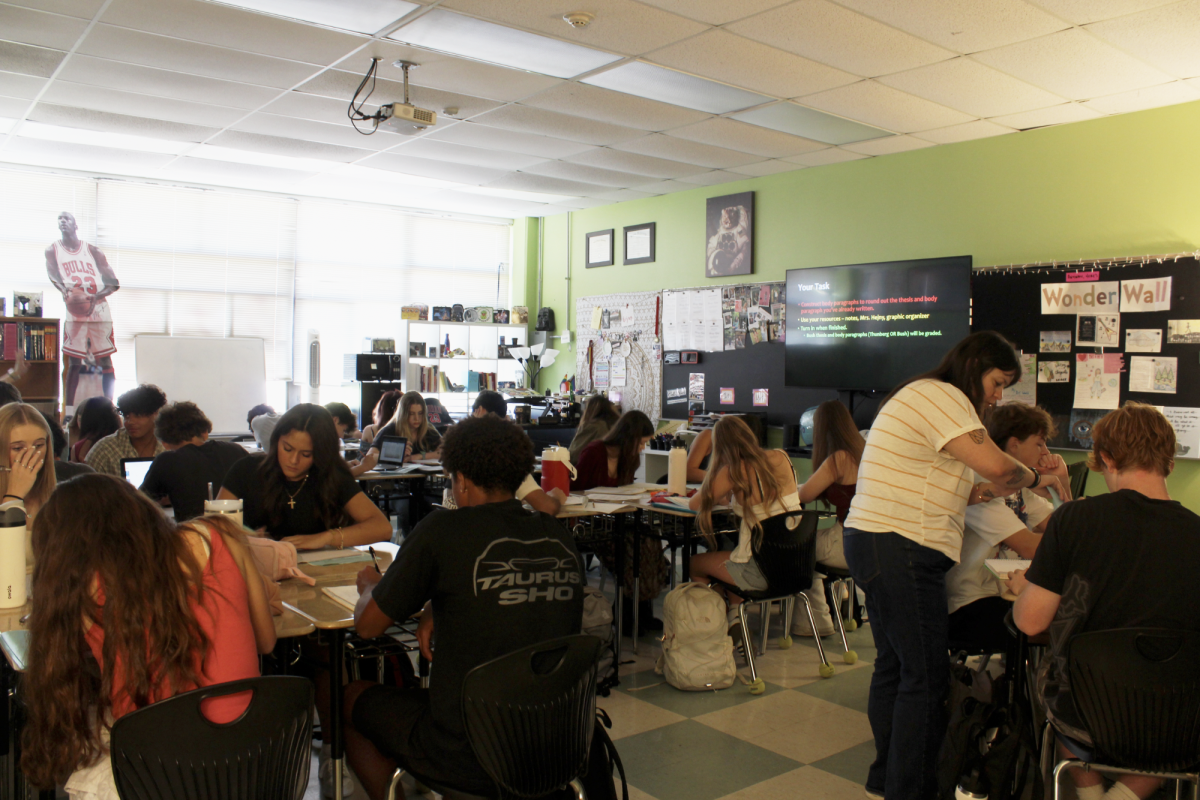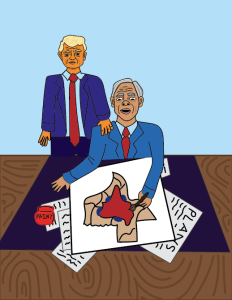Black History Month
February 25, 2017
During the month of February people around the world celebrate Black History Month. Black History Month is a national holiday created by Carter G. Woodson to celebrate African-Americans and their culture. The event started off only a week-long but eventually turned into a month-long event celebrating famous African-Americans like Dr. Martin Luther King Jr., Rosa Parks, Malcolm X, and many more.
Throughout Black History Month the Multicultural Awareness club sponsor, Joyce Brisco, helps her students understand the true meaning of Black History Month.
“We need an African-American history month every day,” Brisco said. “We were not personified in the history books, our contributions were going unrecognized for all the things African-Americans had done.”
English teacher, Amanda Pfeiffer, helps Brisco plan and carry out all the events the club does during Black History Month.
“Mrs. Brisco and I do everything together so our big events are our soul food luncheons, she does all the cooking and I’m more like the worker bee and logistics,” Pfeiffer said. “We also want to visually remind everyone throughout the month of February what we are celebrating. I’m in charge of spearheading the effort of decor and just having the visual presence of Black History Month. We coordinate paintings, hang banners, and also decorate the doors of the English teachers which we hope to spread to all of the departments this year. We play music by famous African-Americans like Beyonce, Michael Jackson, and many more in A hall, so we try to tackle all the senses.”
For sisters Oluwaseyi and Oluwaseun Odufuye, they feel like Black History Month is needed to spread love and equality into the world.
“I believe people need to learn about Black History Month as a way of continuously encouraging equality and love,” Oluwaseyi said. “Also this month is to expose all the sacrifices African-Americans have made to create the world we live in right now.”
According to Oluwaseun, people of all races need to come together right now and educate themselves to fight the injustice going on in the world right now.
“People should educate themselves in black history and then they should get the importance of staying educated, the importance of unity, of being brave, and always standing up for your rights,” Oluwaseun said. “I feel like people need to come together more right now to fight, especially since we have a racist misogynist as a president. We need to stand up together.”
President of the Multicultural club, senior Jeremy Faulkner, helps Brisco and Pfeiffer but also helps students plan their announcements.
“One of my favorite things to help out with is the luncheon and the announcements,” Faulkner said. “ For the announcements we get to pick one of our favorite African-Americans and make a little speech about them and present it to the whole school on the intercom in the morning after the pledges. When we have the luncheon, we have everyone bring their favorite food which include mashed potatoes, green beans, greens, and chicken. We have a wide array of food that students and Mama B cooks for the faculty and staff on campus.”
According to Oluwaseyi, African-Americans have faced and are still facing racism in the world today. She also has faced racism before in her life.
“Growing up I faced some nasty comments over the pigment of my skin,” Oluwaseyi said. “I was slapped on my butt by one of my peers, I guess because it was bigger than the other girls. I was told I was ugly because of the color of my skin and once some comments were made by two little white girls when I walked into a public bathroom.”
Growing up in the civil rights era Brisco and English teacher, Vicki Hebert, were around a sea of racism during the 50’s and 60’s.
“If you read our history books the contributions and important things that have influenced our African-American community are not there,” Hebert said. “I would love to say that it’s getting so much better, I see it going backwards and getting worse. You have to understand that my parents were not liberal so I grew up around a great deal of racism, I grew up around people who used the, ‘N,’ word freely, I grew up very aware of segregation and everything that was going around me.”
At the age of 10 or 11 Brisco, her sister, brother, and a friend were challenged with racism while trying to get a beverage at a little restaurant in Arkansas.
“My older sister, brother, friend, and myself just wanted to go into an establishment and have a Coca-Cola and my sister, brother, and friend were arrested for inciting a riot and the only thing we wanted to do was get something to drink,” Brisco said. “I was not arrested but I very much remember my sister, brother, and friend being arrested as teenagers for stopping in an all white establishment for a coke.”
For Faulkner a famous African-American he looks up to is famous talk show host, Oprah Winfrey.
“I look up to Oprah Winfrey because she understands people and her words are just so inspiring to people who need help,” Faulkner said. “You can just look up one of her videos and she can guide you through the right pathway and you don’t even have to be with her.”
When Brisco went to school the school systems were segregated just like everything else in the United States at the time.
“I grew up in the southern belt and our school systems just like the states in the south were segregated and with that segregation came racism,” Brisco said. “It was so bad that our supplies we had in our schools were either second hand or third hand. In terms of racial tension, it was high mostly because we were growing up in separate parts of town.”
Beyonce and Solange are two big idols for Oluwaseun because they both stand up for what is right and what is good for the community.
“There are so many African-Americans alive and dead that have done so much for us,” Oluwaseun said. “One for me would be Beyonce for standing up for black lives as well as empowering woman. Another would be Solange for being unapologetically black and showing that, ‘I,’ is a good thing.”
According to Pfeiffer having a Black History Month is something crucial that is needed for American culture.
“It’s crucial in American culture to recognize the immense benefit that is cultural diversity,” Pfeiffer said. “Particularly African-American culture due to the history this country has of slavery and subjugation. It is paramount that this root be recognized and be given this time and I wouldn’t have it any other way.”
When Hebert was younger she had a hands-on experience with segregation on the Dallas city bus on her way to the state fair.
“When I was in the first grade my daddy took me to the state fair because in Dallas you get a day off for the fair. We took the bus because my daddy didn’t want to park at Fair Park because he didn’t want to pay a poor African-American family to park in their front lawn. I had always thought it has to be the absolute coolest thing in the world to sit in the very back of the bus and watch where you’ve been. I ran to the back of the bus and my dad gave me that dad voice and said, ‘Vicki Kay Sanders you get back here right now, that’s where the N’s sit,’” Hebert said. “And at the fair I was waiting to drink water in this long line and I saw this water fountain with no line and I went to drink some and my daddy stopped me and said that’s the colored fountain.”
For Brisco, Black History Month isn’t just like any other holiday that is celebrated, it’s a time where people need to realize that there were sacrifices made so the entire community can live the life they have now.
“Black History month means empowerment, it means pride, it means passion, it means humility,” Brisco said. “There were so many people who gave their lives just so that African-Americans could vote. Things that we take for granted everyday, just to go to school and be considered an equal was not a given, someone gave their life for the treasures we take for granted every single day. As an African-American woman and having first hand experienced the sting of de-segregation, I won’t forget what it means now to see students being able to have choices and not be afraid that those choices are going to be able taken away from you.”
One thing that Pfeiffer is wanting students to take away is to honor the culture.
“Honor, honoring the legacy of this culture, this group of people,” Pfeiffer said. “It has to be passed on, it has to be recognized, and preserved. It’s also more imperative now than ever in our country with the cultural climate that there be solidarity, that there be enlightenment, that there be open mindedness, and that we embrace all that is beautiful about the melting pot of cultural diversity.
One worry for Pfeiffer is going backwards on the timeline of history.
“We need to not look for ways to revert back to old times of segregation where one group was in power and subjugating and disenfranchising another.,” Pfeiffer said. “More than ever students deserve the right to have that unedited, unabridged history and learning that it is so crucial to having empathy for human beings.”








